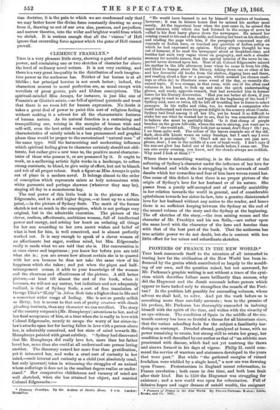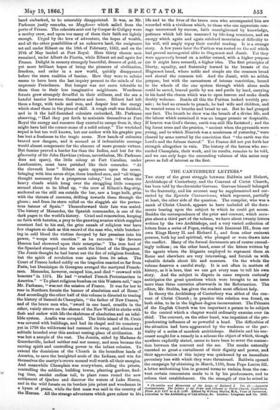PIONEERS OF FRANCE IN THE NEW WORLD.* Tuts book commends
itself to the attention of all interested in tracing how far the civilization of the New World has been in- fluenced by the genius which contributed so largely to the mould- ing of our own, and the question raised, but not answered, for Mr. Parkman's graphic writing is not without a trace of the cyni- cism which describes failure more brilliantly than success, why did the Huguenot and the Jesuit succumb before powers which appear to have tasked only to strengthen the muscle of the Puri- tan? Is the problem left possibly for succeeding volumes, whose advent we shall hail, to solve. And yet the work before us is something more than carefully accurate ; true to the promise of his preface, Mr. Parkman has thoroughly succeeded in imbuing himself with the spirit of the time, and writes with the vivacity of an eye-witness. The condition of Spain in the middle of the six- teenth century has been so fruitful a theme for all historians since, that the veriest schoolboy feels for the subject a familiarity bor- dering on contempt. Dreaded abroad, paralyzed at home, with no power remaining to create, but strong still to retain her grasp, her condition is well described by our author as that of "an athletic man penetrated with disease, which had not yet unstrung the thews and sinews formed in his days of vigour. Philip IL could com- mand the service of warriors and statesmen developed in the years that were past." But while "the gathered energies of ruined feudalism were wielded by a single hand," a new era was dawning upon France. Protestantism in England meant reformation, in France revolution ; both came in due time, and both bore fruit after their kind. But in 1550 the Huguenot was struggling for existence ; and a new world was open for colonization. Fall of delusive hopes and eager dreams of untold wealth, the emigrant
• Pioneers of France in Me New World. By Francis Parkman. llaiton: Little, Brown, and Co. 1865. band embarked, to be miserably disappointed. It was, as Mr. Parkman justly remarks, no Mayflower which sailed from the ports of France. The colonists sent out by Gaspar de Coligny were a motley crew, and upon too many of them their faith sat lightly enough. Urged by the love of adventure, the hopes of wealth, and all the other possibilities of an unknown land, the emigrants set sail under Ribaut on the 18th of February, 1662, and on the 27th of May landed at Port Royal. Here thirty chosen men remained, under Albert de Pierria, while Ribaut set sail again for France. Delight in scenery strangely beautiful, dreams of gold, or yet more brilliant hopes of being the pioneers of civilization, freedom, and order in a new world, quickly disappeared before the stern realities of famine. How they were to subsist seems to have been the last inquiry present to the minds of the nnprosaic Frenchmen. But hunger was not more tolerable to them than to their less imaginative neighbours. Wondrous forests grew strangely dreadful in their stillness, and the sea a hateful barrier between themselves and home. Ribaut had left them a forge, with tools and iron, and despair lent the energy which stood them in the place of skill. A rough craft was finished, and in it the half-famished colonists embarked, Mr. Parkman observing, "Had they put forth to maintain- themselves at Port Royal the energy and resource they exerted to escape from it, they might have laid the corner-stone of a solid colony." The wretched sequel is but too well known, but our author with his graphic pen has lent a freshness to the tragic scene. New bands of colonists braved new dangers, and it seemed as if indomitable courage would almost compensate for the absence of more prosaic virtues. But famine proved a harder foe than the Indies, and but for the generosity of Sir John Hawkins (whom, nevertheless, Mr. Parkman does not spare), the little colony at Fort Caroline, under Laudonniere, must have perished like their comrades. "At the eleventh hour" Ribaut again appears upon the scene, bringing with him seven ships, three hundred men, and "all thiligs thought necessary for a prosperous colony," but just when the heavy clouds which hung over the struggling little company seemed about to be lifted up, "the crew of Ribaut's flag-ship, anchored on the still sea outside the bar, saw a huge hulk, grim with the throats of cannons, drifting towards them through the gloom ; and from its stern rolled on the sluggish air the porten- tous banner of Spain." Thenceforward their fate was sealed. The history of Menendez, the Spanish commander, is one of the dark pages in the world's history. Cruel and remorseless, keeping no faith with heretics, a prey to the gnawing avarice which supplied constant fuel to his zeal, the grim annals of religious war have few chapters so dark as this record of the man who, while butcher- ing in cold blood the victims decoyed by fair promises into his power, "weeps with emotion" as he recounts " tlie favours Heaven had showered upon their enterprise." The iron heel of the Spaniard stamped into the earth the blood of the Huguenot. The Jesuit thought he had burnt out the fire of religious freedom, but the spirit of revolution rose again from its ashes. The Court of France looked coldly on the tragedies enacted so far from Paris, but Dominique de Gourgues avenged the martyred French- men. Menendez, however, escaped him, and died " crowned with honours" in 1574. He had "crushed French Protestantism in America." "To plant religious freedom on this Western soil," says Mr. Parkman, "was not the mission of France. It was for her to rear in Northern forests the banner of absolutism and of Rome." And accordingly the other half of this volume is directed to tracing the history of Samuel de Champlain, "the father of New France," and of the brave men who, "sword in one hand, crucifix in the other, vainly strove on the shores of the New World to clothe with flesh and endow with life the skeletons of absolutism and an infal- lible system. Acadia was occupied. The little island of St. Croix was covered with buildings, and had its chapel and its cemetery ; yet in 1798 the wilderness had resumed its sway, and silence and solitude brooded over this ancient resting-place of civilization. It was but a sample of the rest. The Jesuits, aided by Madame de Guercheville, lacked neither zeal nor money, and soon became the moving spirit and controlling power in the infant colonies. To extend the dominions of the Church in the boundless lands of America, to save the benighted souls of the Indians, and win for themselves the martyr's crown seemed well worth all their energies. And meanwhile Champlain was everywhere, aiding the priests, controlling the soldiers, building towns, planting gardens, find- ing time, amidst endless toil, to plant roses round the new settlement of Quebec and discover the waters of Lake Huron, and in the wild forests on its borders join priest and woodsman in a hymn of praise, while the first mass was said in the country of the Hurons. All the strange adventures which gave colour to his
life and to the lives of the brave men who accompanied him are recorded with a vividness which, to those who can appreciate cou- rage uncrowned by success, faith unenlightened by knowledge, patience which left him unsoured by life-long vexations, and an energy which again and again subdued mountains of difficulty to his will, will amply repay their careful reading. It is a strange story. A few years later the Puritan was rooted on the soil which • had proved uncongenial alike to I I uguenot and Jesuit. Yet they were apparently bound on a nobler errand, with a higher purpose (so it might have seemed), a higher idea. The first principles of liberty, equality, and fraternity burned in the breasts of the Huguenot band, where noble and simple ate the common bread and shared the common toil. And the Jesuit, with no selfish purpose, but with the earnestness of intense conviction, bound to the wheels of the one system through which alone souls could be saved, braved perils by sea and perils by laud, carrying in his hand the charm which was to open heaven and make death doubly welcome. Beside all this the Puritan looked terribly pro- saic; he had no crusade to preach, he had wife and children, and he wanted room to breathe and bread to eat. But he had grasped one fact. The breath he drew was the breath of a divine life, and the labour which sustained it was no longer prosaic or despicable. If heaven was God's throne, earth was still His footstool ; and the big forest trees and the prairies, "ancient when the pyramids were young, and to which Nineveh was a mushroom of yesterday," were cleared by arms nerved by the conviction that "the earth was the Lord's and the fulness thereof." Yet France did not put forth her strength altogether in vain. The history of the heroes who suc- ceeded Champlain, their work, and its results, remains to be told, and we can only hope the succeeding volumes of this series may prove as full of interest as the first.































 Previous page
Previous page